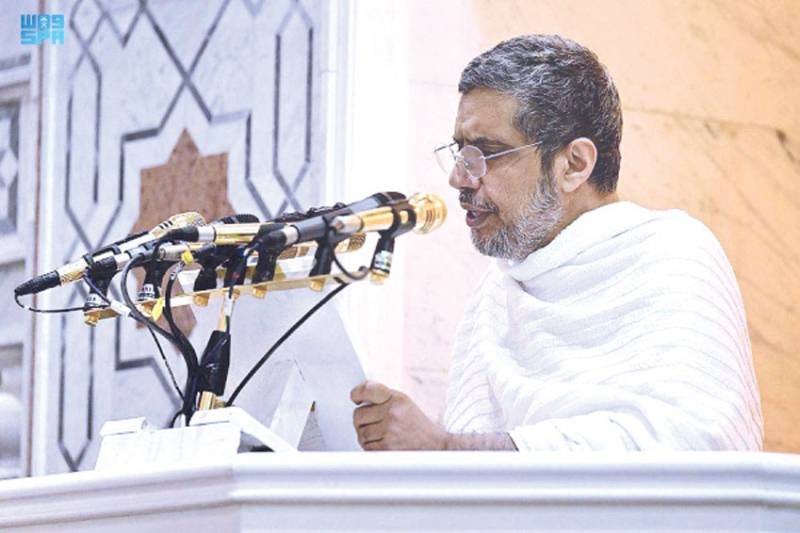Respecting humanity compulsory for Muslims: Hajj sermon
ARAFAT - Chanting “Labbaik Allahumma Labbaik (O God, here I am answering Your call)...,” the pilgrims flocked this morning to Namirah Mosque in Arafat, about 15 km east of Makkah, after spending a night of meditation and introspection in the Tent City of Mina. Sheikh Muhammad Al-Issa, member of the Council of Senior Scholars and secretary general of the Muslim World League (MWL), delivered the Arafat sermon at the grand Namirah Mosque. The sermon resembles the famous farewell sermon of Prophet Muhammad (Peace Be Upon Him) when he performed his only Hajj.
In the sermon, Sheikh Al-Issa urged all Muslims to obey what God has commanded and avoid what He prohibited in order to attain victory, salvation, and happiness in both this world and the hereafter.
“You must realise that hastening to do good things includes being keen to comply with the values taught by Islam; values that soundly mold the conduct of a Muslim and refine them in the best way. Among the values taught by Islam are avoiding all that leads to dissent, animosity, or division; and instead, ensuring that our interactions are dominated by harmony and compassion,” he called on the pilgrims. Dr Al Sheikh Muhammad bin Abdul Karim Al Issa also said respecting and valuing humanity is compulsory for all Muslims. He said success lies in fear of Allah Almighty and following His orders. He said the Muslims should exhibit best of the manners as only those who will have good manners will be close to the Holy Prophet (Peace Be Upon Him) on the Day of Judgment.
After the sermon, Sheikh Al-Issa led the prayers. Retracting the noble tradition of the Prophet (PBUH), he performed noon (Dhuhr) and evening (Asr) prayers, shortened and joined together, with one azan and two iqamas. Pilgrims joined the prayers at and around Namirah Mosque, and then started performing the Standing (wuqoof) at Arafat.
Wuqoof Arafat, one of the four pillars of Hajj, begins after noon prayers. Pilgrims would engage in prayers and supplications until after sunset. They will seek forgiveness and pleasures of Allah. Many of the worshippers were seen holding umbrellas against the fierce sun while chanting Talbiyah and reciting verses from the Holy Qur’an after ascending on Jabal Al-Rahma (the Mount of Mercy) in Arafat.
Muslims in most parts of the world are observing fasting on Friday in a sign of solidarity with the pilgrims. It is a great Sunnah for those who do not perform Hajj to observe fasting on Arafat Day. After spending a whole day and night in Mina in prayers and meditation on the first day of Hajj (Yaum Al Tarwiyah) on Thursday, they proceeded early this morning to Arafat on board Mashair train, buses and other vehicles. All roads to Arafat were packed with worshippers as helicopters buzzed overhead and volunteers handed out bottles of water and collected rubbish in green plastic bags.
Saudi authorities mobilised all their resources and facilities to make the movement of pilgrims from Mina to Arafat a great success. The pilgrims took their places in the 110,000-square-meter Namirah Mosque and 8000-square-meter courtyards well before the start of the Arafat Day sermon. The pilgrims’ movement was under direct follow-up of the personnel of the various security sectors to organize the movement, in addition to guiding pilgrims and ensuring their safety. Different government sectors taking part in the service of pilgrims are providing all medical, emergency and catering services in Arafat.
After completing the ritual of standing at Arafat by sunset, pilgrims then move to Muzdalifah in a calm and dignified manner, reciting Talbiyah a great deal. They will offer the Maghrib prayer with three Raka’a and Isha prayer in two Raka’a at the time of Isha after reaching Muzdalifah, and spend the night there in supplication.
A total of 850,000 foreign pilgrims and 150000 domestic pilgrims are performing the biggest Hajj pilgrimage since the pandemic this year. This was for the first time foreign pilgrims are allowed to perform Hajj since the outbreak of coronavirus pandemic before the Hajj of 2020. The Saudi authorities allowed limited number of domestic pilgrims to perform the annual pilgrimage during the last two Hajj seasons that held in the unprecedented pandemic situation and travel restrictions.
Only those pilgrims under the age of 65 who took at least two doses of coronavirus vaccine and have a negative PCR test are allowed to perform Hajj this year. Before the pandemic period in 2019, about 2.5 million pilgrims from within the Kingdom and abroad performed the annual pilgrimage.






